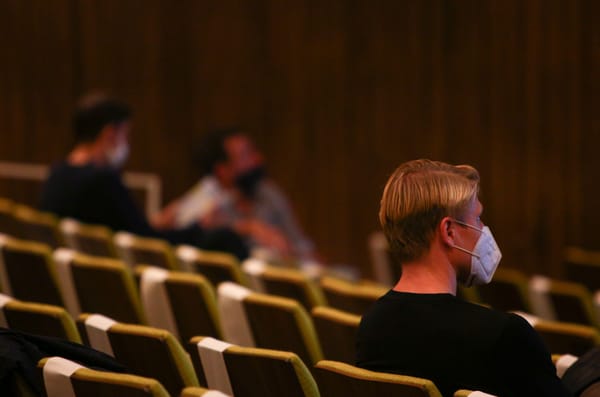If you’ve been to a play, symphony, opera, ballet, or musical in New York City lately, chances are you’ve been warned at least once by a worried usher to cover your nose completely at all times. Chances are, you’ve been given a mask at the door since you’ve stopped wearing one elsewhere (likely you were maskless at a restaurant before the show). Chances are, you’ve found this strange, a bit of an anachronism. Certainly I have, and quite recently. As Covid theater largely, though not entirely, disappears from public life, the performing arts remain slower to evolve. Aside from hospitals, a performing arts center is the place where you’re most likely to see masked faces, or have to show your booster at the door.
Arts institutions are now slowly dropping mandates, but the deep embrace of what we might call bio-theater by the theater-theater reveals a great deal about the arts in America. It shows that they have lost hold of the tether to their radical pasts, and are no longer able to contribute anything to our culture beyond reification of liberal pieties. When Covid theater displaces real theater, the potential for live performance to disrupt and challenge us intellectually, and morally, is automatically repressed by the structure of the theater-going experience itself.
Covid protocols have lingered in performance spaces, I suspect, because they reduce the expectation that the work itself should surprise us. They prime us in advance to be docile, compliant, still. An audience forced to submit to unreasonable rules is discouraged from thinking critically about what it’s seeing.
“The norms of major arts institutions are indistinguishable from regime politics.”
The Covid era has revealed that the norms of major arts institutions are indistinguishable from regime politics. Donning of the mask, or flashing of the booster, is a kind of declaration of loyalty. These vestigial protocols are there not to protect the audience or the performers (no one seriously believes in any of this at this point), but to remind us that we are in a certain kind of sociopolitical place. Arts institutions are almost invariably committed to right-think; the spirit of music, drama, and dance lives under the letter of bureaucratic law.
Safetyism is the death of performance as art. Ritualistic “covid safety” practices drain money, time, and goodwill backstage (ask almost anyone producing for the stage), while overzealous ushers hack away at the kinetic bonds between audience and audience, audience and performer. Masking, in turn, removes incredibly important human data, or emotional information, from the collective experience.
Going to see live performance means being swaddled in the semiotics of safety, reminded as soon as you walk in the door (when free masks are offered), that no one wants you to feel even slightly uncomfortable. The focus becomes the maintenance of protocol, the social performance of being a good liberal, urban subject, rather than the performance on the stage. The experience of theater-going is dictated by the demands of the most anxious and phobic members of the audience, which prevents the theater from serving its classic and universal function, the purging of communal anxieties.
Regimes of biosurveillance, integrated into culture, destroy culture from within. I feel the way about many bookstores that I do about theaters. At least in New York, where I live, they have lost their magic, and are no longer worth lingering in. Covid gave cultural institutions license to act like institutions, to exercise control for the sake of control over whoever comes through the doors, charging more, providing less. As Ivan Illich wrote, institutions “shape not only our preferences but actually our sense of possibilities”—and institutions today seem committed to suggesting that very little is possible beyond a certain narrow conception of life.
To those who think there’s nothing wrong with continuing to take precautions, I would say that Covid protocols have accelerated a process that was already underway, one in which our shared sense of possibility is sharply limited by bureaucratic rule-making. Fear of litigation or protest is at war with the spirit by which the great works of drama, music, and dance reach the soul.
